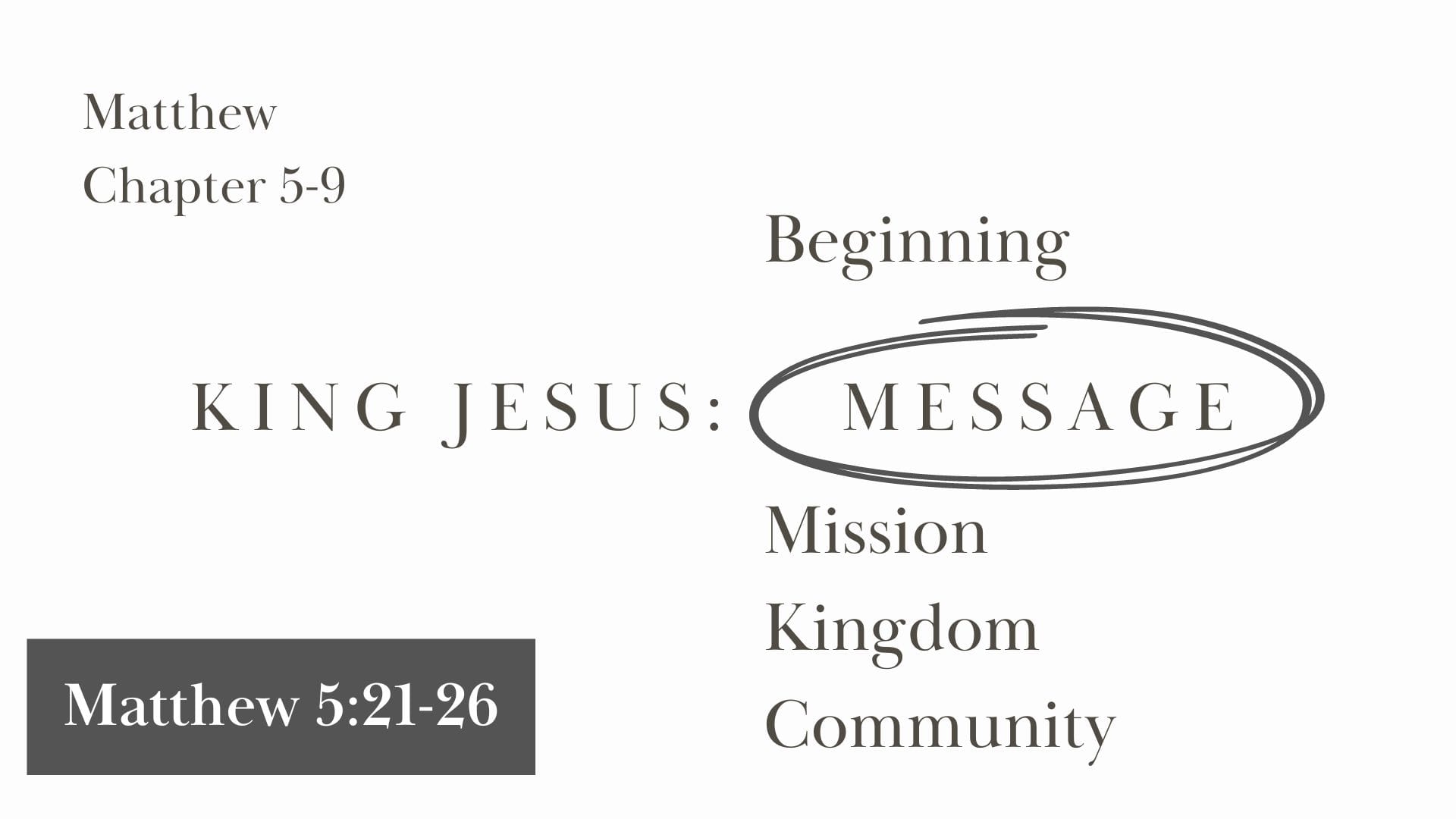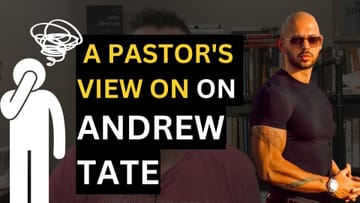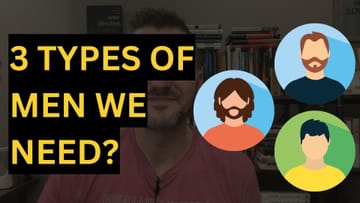Text:
You have heard that our ancestors were told, ‘You must not murder. If you commit murder, you are subject to judgment.’ But I say, if you are even angry with someone, you are subject to judgment! If you call someone an idiot, you are in danger of being brought before the court. And if you curse someone, you are in danger of the fires of hell. So if you are presenting a sacrifice at the altar in the Temple and you suddenly remember that someone has something against you, leave your sacrifice there at the altar. Go and be reconciled to that person. Then come and offer your sacrifice to God. When you are on the way to court with your adversary, settle your differences quickly. Otherwise, your accuser may hand you over to the judge, who will hand you over to an officer, and you will be thrown into prison. And if that happens, you surely won’t be free again until you have paid the last penny.
The foundation of the Kingdom of God is an unshakable JOY that GROWS from the bottom up.
Overall Commentary: 🌎
This text is the first of six sections where Jesus teaches us a principle, followed by a "practical," and finishes with examples. As you read through these over the next few weeks, notice this repeated pattern.
Jesus has just finished saying the foundation of it all is His Word. He calls out anyone who tries to add or take away from His Word. I wonder if the audience was feeling a little good about it. Jesus was setting the record straight and putting all the "villains" in their place. Jesus begins to build that unshakable foundation and takes on the next "villain" in the room. Who's next? Get 'em, Jesus. It's not who you think, and Jesus says that unshakable joy comes in ways we do not always realize.
Jesus says unshakable joy grows when we accept responsibility for the PAIN WE CAUSE OTHERS.
Verse 21- The Universal Principle, then the Practical steps toward healing.
Cross-references: Exodus 20:13, Deuteronomy 5:17, Numbers 35:30-34
"You have heard it said"- Jesus says they have been taught the principle but not how to apply it. The idea of this commandment was not to speak only have taking human life. It was also speaking to the heart.
"murder"- Jesus is making an important distinction. Pacifists have interpreted this commandment as, "Thou shalt not kill." The King James Version of the Bible was a significant translation for a long time with this phrasing. The original has been muddied as words have slightly changed meaning over time. The Hebrew word means premeditated murder. Not all killing is sinful. The act of ending human life is terrible because everyone has been made in the image of God. However, ending human life is allowable when it is an act of self-defense, in a holy war, or to correct injustice.
"But I say"- Jesus is not saying Old Testament is wrong. He says it is right and wants to help us understand the original intent more fully.
Accepting responsibility grows joy because…
Verse 22- It opens my eyes to see the progression of offense.
Cross-references: 1 John 3:14-15, 1 John 4:20-21, 1 John 2:9, Ephesians 4:26-27, James 3:6, Romans 12:10, 1 Peter 3:9
Jesus now gives us the practical application of why we must watch what we think. He shows how an offense can turn into something that can ruin our lives.
"Angry... judgment."- FRUSTRATED with the person.
- The first step is when we become angry. We need to judge our emotions right then and not allow the seed of anger to turn into anything more. It is not a sin to become angry. Some places in the Gospel talk about Jesus becoming angry with those around Him. Sin is "crouching at the door" when we do not deal justly with these negative emotions healthily.
"You call them an idiot... the council."- OFFENDED with people.
- The word "idiot" means literally "empty-headed" or "worth nothing." The idea here is you are no longer angry. You are now coming against their character and speaking against them. Jesus says when you do this, you may be brought to the "courts." The courts were the Sanhedrin. This was the ruling body that legislated the Jewish people under the permission of the Roman government. The problem is now no longer between you and the person. It has now spread to the community, and you now have a problem with the community.
"You curse them... hell fire."- BITTERNESS toward God.
- The word "hell fires" had a double meaning during the time of Jesus. The primary meaning was an actual location. It was an area where the Canaanites would offer human sacrifice and perform various paganistic worship. It was also the basic idea of a garbage dump for the Jewish people. They disposed of everything vile there, including human waste! Because it was a place of such terrible reproach, it became synonymous with hell. Jesus is saying you can get to a place where it ruins your life and causes bitterness between you and God.
(Ephesians 5:15-17) So be careful how you live. Don't live like fools, but like those who are wise. Make the most of every opportunity in these evil days. Don't act thoughtlessly, but understand what the Lord wants you to do.
Joy grows as I learn why hurting people HURT PEOPLE.
Verse 23-24: It opens my eyes to the path to healing.
Cross-references: Mark 11:25, Leviticus 6:2-6, Luke 19:8, 1 Samuel 15:22, Hosea 6:6, James 5:16, Romans 12:17-18, 1 Peter 3:7-8, 1 Corinthians 6:7-8
Jesus not only helps us see where we sometimes hurt people, but He also helps us know the steps to finding freedom and bringing it to others.
"So if you are presenting a sacrifice at the altar in the Temple and you suddenly remember that someone has something against you, leave your sacrifice there at the altar. Go and be reconciled to that person. Then come and offer your sacrifice to God."
1- BRING IT to God first.
- Everything starts with the Lord. On Yom Kippur, the Jewish people were required to go to the Temple and offer a sacrifice for their sins. While doing this, they were supposed to ask the Lord to reveal anything they needed to repent. Jesus says the Lord will tell us where to walk in freedom, but we should also ask Him to do so. Don't just expect it to "pop" into your head. Make a habit of inviting the Lord to reveal any area of your life that could be used to bring freedom to others.
2-Do it ON PURPOSE.
- Jesus says we should leave our offering and go. The journey from the Temple to Galilee was about a three-day trip. Jesus is saying it is essential that we are willing to make ourselves uncomfortable and inconvenienced.
3- Be SPECIFIC. Make it PERSONAL.
- Jesus says we should go and be reconciled to them. This is an essential distinction because forgiveness and reconciliation are two different things. Forgiveness is primarily between you and the Lord. Reconciliation is mainly between you and the person. Jesus also says this is a way to let us know this is not a chance to offer them an opportunity to ask forgiveness. They have to work that out between them and the Lord. This is about us doing our part to bring healing to others.
4- Put it in GOD'S HANDS.
- The process begins and ends with the Lord. Imagine someone hurt you. Then, sometime later, they come to try to make it right. Would you be ready to receive their repentance? Maybe. Maybe not. Therefore, you need to give them the same space you would require. In the end, you leave it in the hands of the Lord and trust Him to do the healing.
(Ephesians 4:25-27) So stop telling lies. Let us tell our neighbors the truth, for we are all parts of the same body. And "don't sin by letting anger control you." Don't let the sun go down while you are still angry, for anger gives a foothold to the devil.
Joy grows when I see that Jesus heals me so I can BRING HEALING to others.
Verse 25-26: It opens my eyes to see now the time.
Cross-references: Luke 12:58-59, Proverbs 25:8, Hebrews 3:13, Luke 14:31-32, Hebrews 3:7, Isaiah 55:6-7, Matthew 18:34, Luke 12:59, James 2:13, 2 Thessalonians 1:9
"quickly"- Jesus encourages us to make it right quickly. The biggest issue with having an offense is we are the last ones to see it. We can continue to defend ourselves and continue to proclaim our innocence. Eventually, it all comes out, and we are imprisoned by our bad decisions. Jesus tells us now is the time to make things right.
(James 5:16) Confess your sins to each other and pray for each other so that you may be healed. The earnest prayer of a righteous person has great power and produces wonderful results.
Because of Jesus, you can now say... Joy grows because I know what God can do. He has done His work first in Me. I will pray for the opportunity to bring healing to... (Pray, and God will help you know who.)
Questions/Journal Prompts for reflection
- Have you thought about where the offense and deep anger come from?
- Why do you think we struggle to "own" our issues?
- Do you have a story of relational healing? Tell us.
- Did the Holy Spirit bring someone to mind to whom you could bring healing?
Resources
Reconciling With People That We Have Hurt
Seven Lessons From Mister Rogers
Crime Statistics in the US in 2010 (Crimes of Passion)













